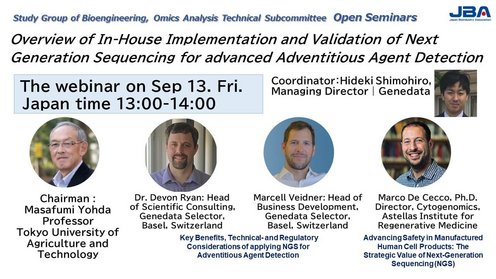Japan Bioindustry Association (JBA) Seminar: Overview of In-House Implementation and Validation of Next-Generation Sequencing for Advanced Adventitious Agent Detection
Genedata & Astellas Institute for Regenerative Medicine (AIRM) will give a talk at the Omics Analysis Technology in Bioengineering Seminar "Overview of In-House Implementation and Validation of Next-Generation Sequencing for Advanced Adventitious Agent Detection" hosted by Japan Bioindustry Association.
To receive more information about Genedata in Japanese, please contact japan(at)genedata.com.
Presentation Overview
Genedata: Key Benefits, Technical, and Regulatory Considerations of Applying NGS for Adventitious Agent Detection
Devon Ryan, Ph.D., Head of Scientific Consulting, Genedata AG
Marcell Veidner, Head of Business Development, Genedata AG
Regulatory agencies, such as the FDA and EMA, recommend using next-generation sequencing (NGS) for viral safety testing of biotechnology products. NGS is more rapid and sensitive than traditional methods for the identification of the nucleic acid content of various adventitious agents in a biological sample. However, analyzing the large amount of data this technique produces can pose a challenge. Genedata Selector® is a leading enterprise software that provides a full solution for analyzing and managing end-to-end large sets of NGS data. In this presentation, Genedata experts will introduce the key aspects of in-house NGS adventitious agent detection operations with a compliant platform and Computerized System Validation (CSV) support.
AIRM: Advancing Safety in Manufactured Human Cell Products: The Strategic Value of Next-Generation Sequencing (NGS)
Marco De Cecco, Ph.D., Director, Cytogenomics, Astellas Institute for Regenerative Medicine
Accurate detection of adventitious agents (AAD) in manufactured human cell products is crucial for patient safety. Next-generation sequencing (NGS) offers high sensitivity, specificity, and broad detection capabilities without requiring prior sequence knowledge. Unlike existing methods, AAD via NGS is hypothesis-free. The NGS workflow consists of multiple steps that require development and optimization to ensure reliable virus detection. These steps include DNA and RNA extraction, library construction, short-read sequencing, and data analysis. Automation and compliant data analysis play a key role in the workflow: to achieve this, we rely on the fully validated and compliant Genedata Selector enterprise software platform and a dedicated AAD playbook. Adventitious Agent Detection via NGS and the associated workflow serve two strategic dimensions of NGS testing. First, they allow tailoring AAD workflows for multiple therapeutic modalities. Second, they enable leveraging NGS workflows to expand testing toward strategic assays, such as genomic stability assessment. In summary, AAD by NGS improves safety profiles and strategically positions manufacturers in the evolving landscape of cell-based therapies. A flexible approach to NGS and its data analysis has become a cornerstone technology, safeguarding patients and fostering innovation.
Talks in English by
Devon & Marcell, Genedata
Marco, AIRM
September 13, 2024, 06:00 CEST
